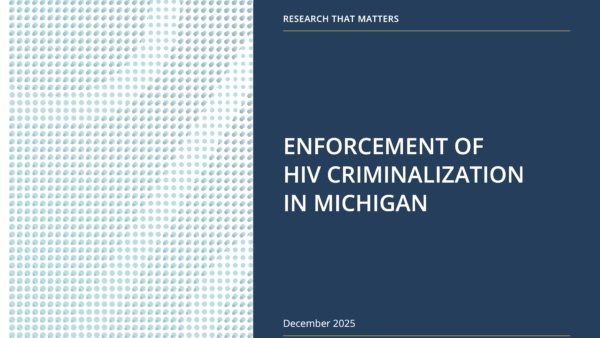
Ohio’s ‘unjust’ HIV-criminalization laws still in effect, state’s revised code shows
by: David Rees
COLUMBUS, Ohio (WCMH) — Ohio is home to several statutes criminalizing HIV, including a felony charge and prison sentence for those with the virus who fail to disclose their status to sexual partners.
HIV-positive Ohioans can be charged with second-degree felonious assault and receive a prison sentence of up to eight years for engaging in sexual conduct without divulging their medical history, Ohio’s Revised Code states. Ohio law also bars those with HIV from donating blood or plasma and penalizes those individuals for exposing others to their bodily fluid, like by spitting or biting.
However, HIV is not transmitted through saliva or unbroken skin and there are no documented cases of the virus spreading through spitting, according to the Centers for Disease Control and Prevention. Those living with HIV also cannot pass the virus through sex when they have reached an undetectable level of HIV in their blood, achieved through medication estimated to be 100% effective.
These antiquated laws have more severe punishments than for reckless homicide, sexual battery, or arson, according to the Ohio Health Modernization Movement. The organization has led the movement calling for reform of Ohio’s provisions that “incorrectly assume an HIV diagnosis is a death sentence.”
“The impact of Ohio’s unjust HIV laws reach far beyond their original intention,” the OHMM said. “They are unproductive because they are unsupported by science. This has led to unjust felony convictions that punish not only the perceived perpetrator, but the community at large.”
Nearly 200 charges under Ohio’s HIV-criminalization laws
One hundred and ninety-two cases across 65 Ohio counties have been confirmed to be connected to statutes criminalizing HIV, according to the OHMM. Of those cases, 104 have been charged for spitting, 60 for felonious assault, 13 for solicitation, four for loitering and one for prostitution.
The OHMM argues the HIV-related criminal prosecutions, of which more than a dozen have been tried in the last few years, are costly. Ohio spends more than $1 billion a year to run its prison system, at a cost of more than $25,000 an inmate.
“The money spent to incarcerate people under HIV criminal laws would be better spent on HIV prevention efforts and supporting the over 20,000 Ohioans living with HIV,” the organization said.
Further, there is no evidence that HIV criminalization laws promote public health by increasing disclosure, HIV testing or practice of safe sex, the OHMM said. The laws have also had zero impact on rates of HIV diagnosis.
The OHMM has built a coalition with Equality Ohio, Equitas Health and the AIDS Healthcare Foundation to call for significant alterations to Ohio’s Revised Code. The group proposals outline several changes including requiring prosecution to prove that a person intentionally transmitted HIV and switching all HIV-specific charges from a felony to a misdemeanor.
“Ohio’s six separate HIV criminalization laws are not based in science, they do not promote public health, and they perpetuate dangerous stigma against people living with HIV,” the organization said. “The time to modernize Ohio’s HIV laws is now.”
Thousands in Ohio living with HIV
More than 27,000 Ohioans are living with HIV and nearly 9,000 are taking a form of medication called PrEP, according to data from AIDSVu and the Ohio Department of Health.
PrEP is a once-daily pill taken to reduce a patient’s likelihood of developing HIV from sex or injection drug use. PrEP reduces the risk of getting HIV from sex by about 99% when taken as prescribed, according to the CDC.
There are two pills available for use as PrEP: Truvada and Descovy. Truvada is for patients at risk through sex or injection drug use, while Descovy is for patients only at risk through sex. PrEP can also be taken through a shot known as Apretude.
Data shows the number of PrEP prescriptions in Ohio has been steadily increasing while the rate of transmission has been slowly decreasing over the past decade.
However, a federal ruling recently struck down provisions requiring health insurance to provide free preventative care services, like PrEP. In response to the ruling, the Justice Department requested a court order to halt the decision while the case is appealed. In the interim, insurers and employers are able to decide whether to continue covering preventative healthcare.
Still, programs have been established that provide PrEP for free or at a reduced cost. Learn more here.









